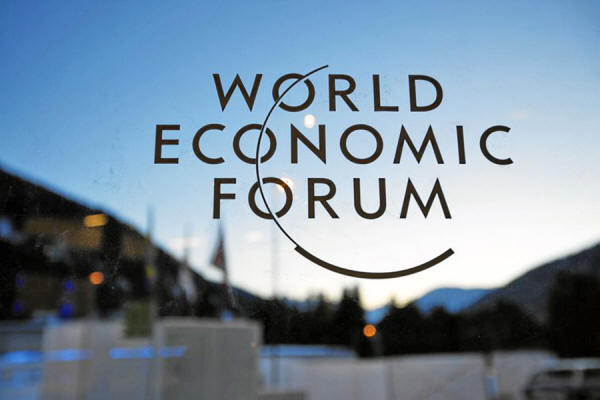|
from
OpenDemocracy
Website World Economic Forum,
CC
BY-NC-SA 2.0 the World Economic Forum gives multinational corporations influence over matters
of global
governance...
A new corporate and government marriage quietly took place last week when the leadership of the World Economic Forum (WEF) and the United Nations (UN) signed a memorandum of understanding (MOU - The United Nations-World Economic Forum Strategic Partnership Framework for the 2030 Agenda) to partner with each other.
While this MOU is proudly displayed on the WEF website, it is nowhere to be found on the UN website.
The only indication on the UN website of this important new development is a picture of the pen used to sign the agreement, and two pictures of the signing ceremony.
One reason for this difference is that the UN's corporate-centered Global Compact has received a good deal of bad press. Now the new WEF-UN agreement creates a second special place for multinational corporations inside the UN...
There is no similar institutional homes in the UN system for civil society, for academics, for religious leaders, or for youth. It is hard to imagine a national government signing a similar formal partnership with one of its business organizations.
At the same time, the UN is under pressure from Donald Trump who wants to deconstruct the whole multilateral system.
For Trump, dismantling the international system built after World War II is a companion piece to his domestic effort at deconstructing the administrative state.
For the Secretary-General of the UN (António Guterres), the pact with the WEF may well be his effort to find new power actors who can support the current system, which is now celebrating its 75th anniversary, in the face of Trump's onslaught.
On the other side, the WEF recently received significant public criticism after giving Hungarian Prime Minister Orban and Brazilian President Bolsonaro a warm welcome at its 2019 Davos gathering.
The timing and managing of public perceptions are not the only interesting aspect of this arrangement.
In 2009, the WEF published a 600 page report entitled the Global Redesign Initiative, which called for a new system of global governing, one in which the decisions of governments could be made secondary to multistakeholder led initiatives in which corporations would play a defining role.
In a sense this WEF study recommended a sort of public-private United "Nations" - something that has now been formalized in this MOU.
His senior staff and the heads of the UN programs, funds, and agencies will also be invited to participate in regional level meetings hosted by the WEF.
It also contains a promise that the UN's individual country representatives will explore ways to work with WEF's national Forum Hubs.
Aware of the mutual importance of public legitimacy each institution can provide for the other, the MOU also contains an agreement to cross-publicize their joint activities.
Besides the institutional blessing of the United Nations,
The scope of each of the five fields for joint attention is narrowed down from the intergovernmentally negotiated and agreed set of goals to one with more in line with the business interests of WEF members.
So under financing,
Under climate change (aka Global Warming), it calls for,
...not actions that result in carbon neutrality by 2030.
Under education,
The MOU explicitly restricts the WEF from making financial contributions to the UN, which might have ameliorated the economic impact of some of Trump's threat to the budgets of the UN system.
At the same time, it avoids any commitment,
All this joint work might have some practical good if it were not for three crucial elements:
Were the Secretary-General convinced of the wisdom of a UN marriage with the WEF, he could have submitted the draft MOU for approval by the member states.
Instead, the Secretary-General joined the WEF in declaring in effect that multistakeholder groups without any formal intergovernmental oversight are a better governance system than a one-country-one-vote system.
All multistakeholder governance groups are largely composed of a self-selected group of multinational corporations and those organizations and individuals that they want to work with.
They work without any common internal rule book to protect the views of all who might be impacted by the group. Participation in multistakeholder group is a voluntary undertaking.
The drop-in-drop-out arrangements are antithetical to the UN's efforts for 75 years to build a stable secure global governance system with a clear understanding of obligations, responsibilities and liabilities.
What is surprising is that by accepting this marriage arrangement with the WEF, the Secretary-General of the UN is marginalizing the intergovernmental system in order to 'save' it...
|


